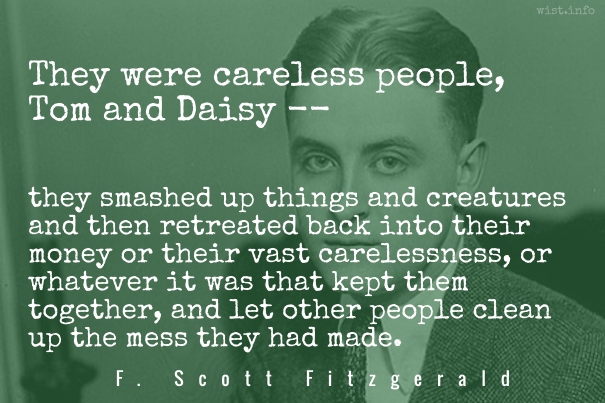CAMILLO:My gracious lord,
I may be negligent, foolish, and fearful.
In every one of these no man is free,
But that his negligence, his folly, fear,
Among the infinite doings of the world,
Sometime puts forth. In your affairs, my lord,
If ever I were willful-negligent,
It was my folly; if industriously
I played the fool, it was my negligence,
Not weighing well the end; if ever fearful
To do a thing where I the issue doubted,
Whereof the execution did cry out
Against the non-performance, ’twas a fear
Which oft infects the wisest. These, my lord,
Are such allowed infirmities that honesty
Is never free of.William Shakespeare (1564-1616) English dramatist and poet
Winter’s Tale, Act 1, sc. 2, l. 310ff (1.2.310-325) (1611)
(Source)
Quotations about:
carelessness
Note not all quotations have been tagged, so Search may find additional quotes on this topic.
Now, as in the Latin and other languages, a yawning fellow is synonymous or equivalent to a negligent and sluggish fellow; this idle custom ought certainly to be avoided; being (as was observed) disagreeable to the sight, offensive to the ear, and contrary also to that natural claim, which every one has, to respect. For when we indulge ourselves in this listless behaviour, we not only intimate that the company we are in does not greatly please us; but also make a discovery, not very advantageous to ourselves; I mean, that we are of a drowsy, lethargic disposition: which must render us by no means amiable or pleasing to those with whom we converse.
[Et ho io sentito molte volte dire a’ savi litterati che tanto viene a dire in latino «sbadigliante» quanto ’neghittoso’ e ’trascurato’. Vuolsi adunque fuggire questo costume, spiacevole -come io ho detto- agli occhi et all’udire et allo appetito; perciò che, usandolo, non solo facciamo segno che la compagnia con la qual dimoriamo ci sia poco a grado, ma diamo ancora alcun indicio cattivo di noi medesimi, cioè di avere addormentato animo e sonnacchioso; la qual cosa ci rende poco amabili a coloro co’ quali usiamo.]
Giovanni della Casa (1503-1556) Florentine poet, author, diplomat, bishop
Galateo: Or, A Treatise on Politeness and Delicacy of Manners [Il Galateo overo de’ costumi], ch. 3 (1558) [tr. Graves (1774)]
(Source)
(Source (Italian)). Alternate translations:A yawner meaneth as much in Latin as a careles and Idle bodie. Let us then flye these condicions, that loathe (as I said) the eyes, the Eares, & the Stomacke. For in using these fashions, we doe not only shewe that we take litle pleasure in the company, but we geve them occasion withall, to judge amis of us : I meane yt we have a drowsye & hevie nowle, which makes us ill wellcom, to all companies we come unto.
[tr. Peterson (1576)]Many times have I heard learned men say that in Latin the word for yawning is the same as that for lazy and careless. It is therefore advisable to avoid this habit which, as I have said, is unpleasant to the ear, the eyes, and the appetite, because by indulging in it we show that we are not pleased with our companions, and we also give a bad impression of ourselves, that is to say, that we have a drowsy and sleepy spirit which makes us little liked by those with whom we are dealing.
[tr. Einsenbichler/Bartlett (1986)]
But evil is wrought by want of Thought,
As well as want of Heart!Thomas Hood (1799-1845) British humorist and poet
“The Lady’s Dream,” st. 16 (1844)
(Source)
First printed in Hood’s Magazine.
Maybe this is the chief thing the dog knows better than we do. There isn’t enough time in life to do anything but love and do our work with joy. We should sleep when we’re tired. Run with abandon. Always be happy to see each other. And never stop believing we will, someday, catch the squirrel.
We can imagine no reason why, with ordinary care, human toes could not be left out of chewing tobacco, and if toes are found in chewing tobacco, it seems to us that somebody has been very careless.
(Other Authors and Sources)
Mississippi Supreme Court in Pillars v. R.J. Reynolds Tobacco Co. et al., 78 So. 365 (Ms. 1918)
(Source)
They were careless people, Tom and Daisy — they smashed up things and creatures and then retreated back into their money or their vast carelessness, or whatever it was that kept them together, and let other people clean up the mess they had made.
It is more from carelessness about truth than from intentional lying that there is so much falsehood in the world.
Samuel Johnson (1709-1784) English writer, lexicographer, critic
Comment (1778-03-30) to Mrs. Thrale, in James Boswell, The Life of Samuel Johnson (1791)
(Source)
During the week of 30 March - 3 April.
… the strange interdependence between thoughtlessness and evil ….
Hannah Arendt (1906-1975) German-American philosopher, political theorist
Eichmann in Jerusalem: A Report on the Banality of Evil, Postscript (1963)
(Source)










